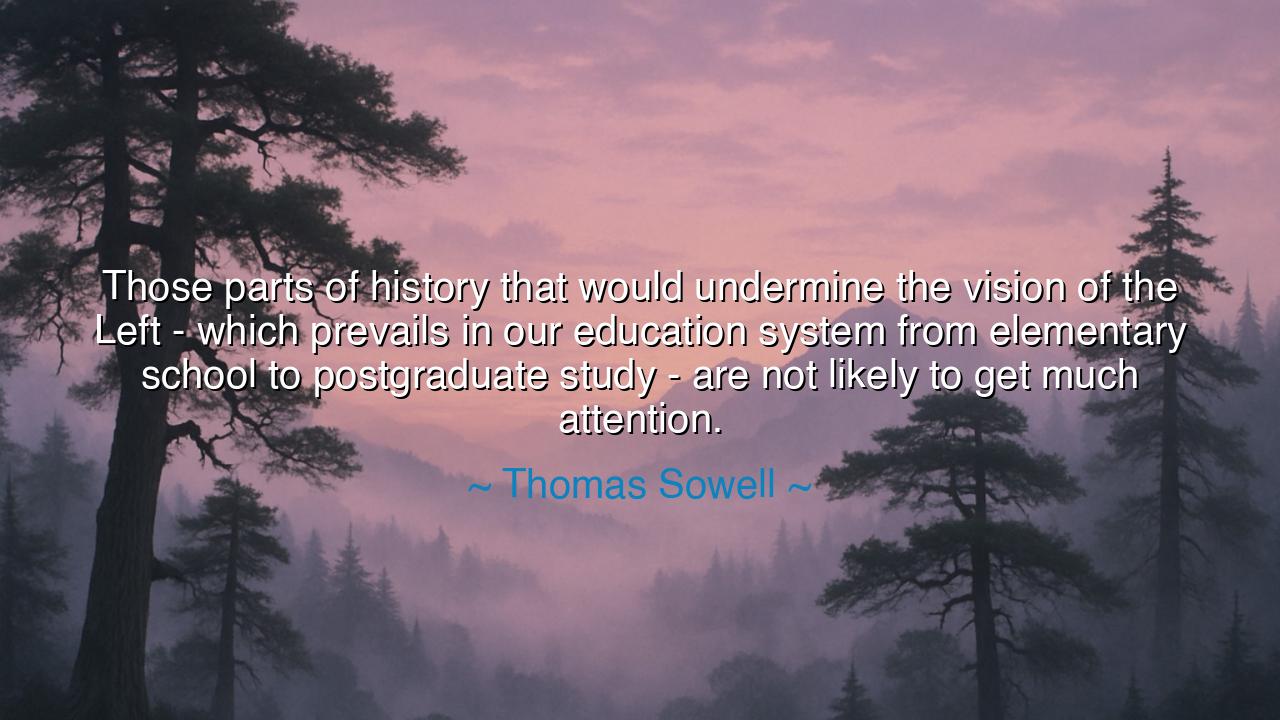
Those parts of history that would undermine the vision of the
Those parts of history that would undermine the vision of the Left - which prevails in our education system from elementary school to postgraduate study - are not likely to get much attention.






Listen closely, children of the ages, and lend your hearts to the words of Thomas Sowell: “Those parts of history that would undermine the vision of the Left - which prevails in our education system from elementary school to postgraduate study - are not likely to get much attention.” Know that history is no mere collection of dates or tales; it is the mirror of the soul of civilizations, a living testament to the triumphs and follies of humankind. And yet, like rivers diverted by human hands, the telling of history is often shaped to serve the vision of those who hold the quill and the authority of instruction. What is emphasized, what is left in shadow, profoundly molds the minds of generations.
From the annals of old, we see this truth reflected. Consider the chronicles of the Roman Empire. The deeds of emperors like Augustus were immortalized with careful selection, presenting him as a bringer of peace and prosperity, while darker acts, the struggles and suffering of conquered peoples, were diminished in the telling. The historian’s pen, wielded by the powerful, can illuminate or obscure, elevate or suppress. Sowell’s insight reminds us that the narratives that reach the young are often chosen not purely for truth, but for alignment with prevailing ideologies, shaping understanding from the earliest lessons in school through the deepest studies of scholars.
In our own age, consider the differing narratives of the American Founding. Many textbooks emphasize the noble ideals of liberty and democracy, yet leave less attention to the contradictions of slavery, the displacement of Native peoples, or the contentious debates over the Constitution’s compromises. Sowell’s warning is clear: history is filtered, and the parts that challenge prevailing political visions often remain unspoken, lost amid the chorus of selected truths. Those who would understand the full sweep of human experience must learn to read between the lines, to question what is taught and what is omitted.
The wisdom here is both caution and empowerment. When history is presented through a narrow lens, it shapes perception, instills beliefs, and can even stifle the courage to think critically. Consider the story of Socrates, condemned by Athens not merely for his teachings but for questioning the accepted narratives of the city-state. His life illustrates that challenging prevailing visions is dangerous, yet necessary, for the illumination of truth. Sowell’s words echo this ancient lesson: one must approach the stories of the past with vigilance, seeking knowledge beyond what is presented.
Even in modern scholarship, one sees this dynamic. Certain economic successes, cultural achievements, or moral lessons that might contradict dominant ideological narratives are often minimized. For instance, the contributions of free-market innovation, voluntary community action, or civic responsibility sometimes receive far less attention than critiques aligned with prevailing doctrines. The student, the citizen, the seeker of wisdom must be like the ancients who scoured multiple sources, questioned narratives, and recognized that truth rarely resides solely in the taught version.
From this understanding emerges a lesson of profound importance: do not accept history as handed to you without scrutiny. Engage with multiple perspectives, read broadly, and cultivate the skill of discernment. The ancients knew that knowledge is power only when it is examined and tested. Sowell’s insight reminds us that the shaping of minds is never neutral; education carries ideological currents, and the wise navigate them with both courage and curiosity.
Practically, this calls for deliberate action: read beyond assigned texts, seek out sources that challenge prevailing narratives, and discuss history with those who hold differing perspectives. Ask questions of teachers, mentors, and elders; do not allow the selective telling of history to constrict your understanding. In doing so, you honor the true spirit of learning, just as the philosophers of old preserved wisdom against the tides of orthodoxy.
Remember, children of the ages: history is not a single story, but a vast river of events, deeds, and ideas. To see its full course, one must look beyond the selective gaze of prevailing powers. By cultivating vigilance, curiosity, and courage, you may navigate the currents of ideology, uncovering the truths that would otherwise remain hidden, and in doing so, equip yourself to act with knowledge, discernment, and wisdom in the world that awaits you.
If you wish, I can also craft a short, vivid narrative of a student or scholar discovering hidden truths in history despite prevailing ideological currents, to make Sowell’s lesson even more tangible for narration. Do you want me to do that?






AAdministratorAdministrator
Welcome, honored guests. Please leave a comment, we will respond soon